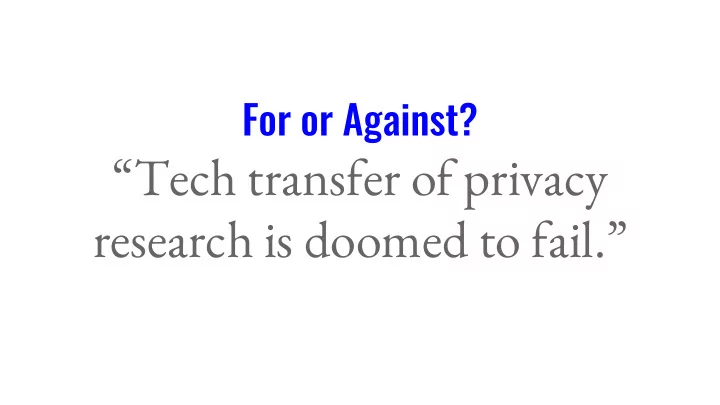

For or Against? “Tech transfer of privacy research is doomed to fail.”
Past visions of the present...
“Tech transfer” of research on computing/communications technology has been extraordinarily successful… in due time. Web: Memex (MIT), NLS (SRI), Hypercard (Apple), Gopher (Minn.), WWW (CERN) ● Web browser: [ U. Illinois → Firefox & Internet Explorer], [KDE → Safari & Chrome] ● Public-key cryptography: Stanford + MIT → RSA, TLS, HTTPS, Bitcoin ● TCP/IP: U.C. Berkeley, USC, UCLA, Stanford ● Practical PC virtualization: Stanford → VMware, Xen, AWS EC2 ● GNU/Linux and open-source software : University of Helsinki, MIT, U.C. Berkeley ●
Q : Is privacy research different? ● “Tech transfer” of research on computing/communications technology has been extraordinarily successful… in due time. ● … even sometimes when it goes against commercial interests. ● Is privacy research uniquely prone to being ignored or co-opted?
Possible reasons why privacy research might be uniquely disfavored Privacy breaches are like earthquakes—people are disinclined to pay a penalty now for ● prevention over long term. The difference between real privacy and fake privacy is too technical for customers to ● understand, so companies can pay merely lip service to privacy without consequence. Nobody knows how valuable machine learning will be in the future, and what data it will ● depend on—so playing it safe means collect all the things!!!1 Exposure is just too valuable for consumers to be able to give up without the alternative ● being worse.
What might cause privacy research to face fewer headwinds? 1. Consumers begin to regard their privacy as more important. 2. Companies begin to regard privacy technology as more important. 3. Everybody realizes that consumer data is just not that valuable. The “strong financial incentive” is illusory.
What might cause privacy research to face fewer headwinds? 1. Consumers begin to regard their privacy as more important. 2. Companies begin to regard privacy technology as more important. 3. Everybody realizes that consumer data is just not that valuable. The “strong financial incentive” is illusory.
Increasing pressure on companies...
What might cause privacy research to face fewer headwinds? 1. Consumers begin to regard their privacy as more important. 2. Companies begin to regard privacy technology as more important. 3. Everybody realizes that consumer data is just not that valuable. The “strong financial incentive” is illusory.
(EU privacy rules)
Trends led by people “in this room” 1. Using a personal computer 2. Using the Internet 3. Using the World Wide Web 4. Using a portable handheld connected computer
Trends led by people “in this room” 1. Using a personal computer 2. Using the Internet 3. Using the World Wide Web 4. Using a portable handheld connected computer 5. Ignoring/blocking/not buying things because of ads
Tech transfer of privacy research is not doomed to fail. Tech transfer in general of computer science research has been extraordinarily successful. ● No strong reason to think privacy is that different. ● Current practice of “overcollecting” is led by: ● overoptimism and conservatism about future machine learning, therefore collect all the things!!!1 ○ overoptimism (or a bubble) in the efficacy of data-driven advertising ○ This too shall pass. ● Meanwhile, there are reasonable commercial and consumer pressures (breaches suck!) that will ● lead privacy research to see similar uptake as other fields of computer security and systems.
Recommend
More recommend